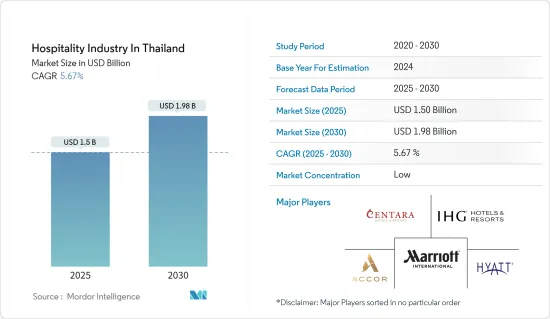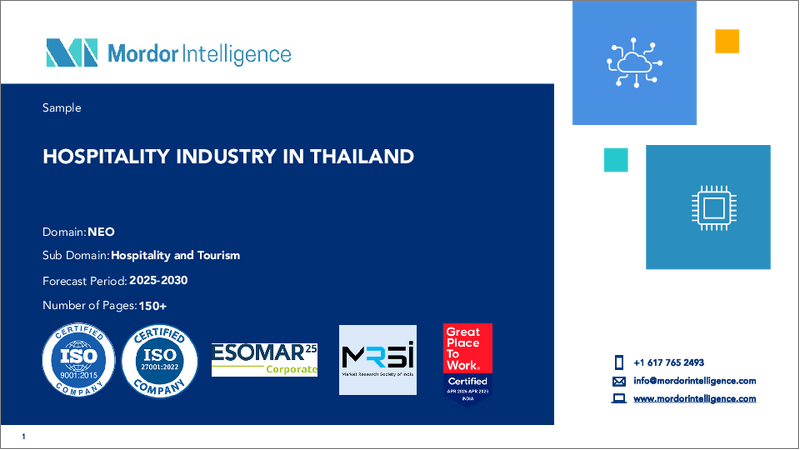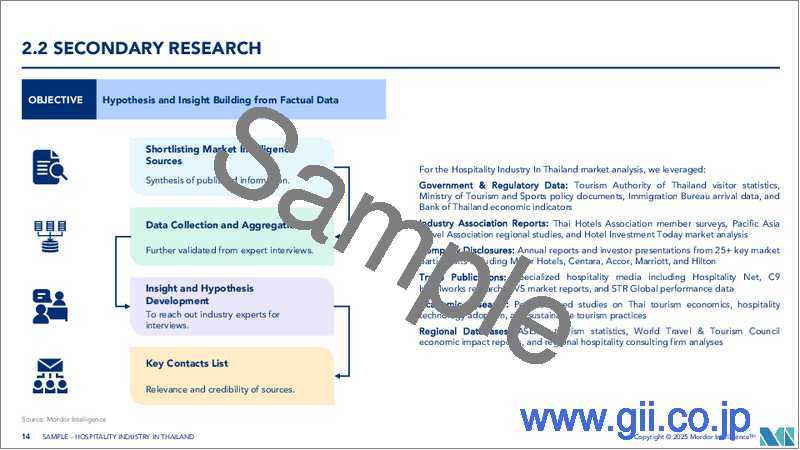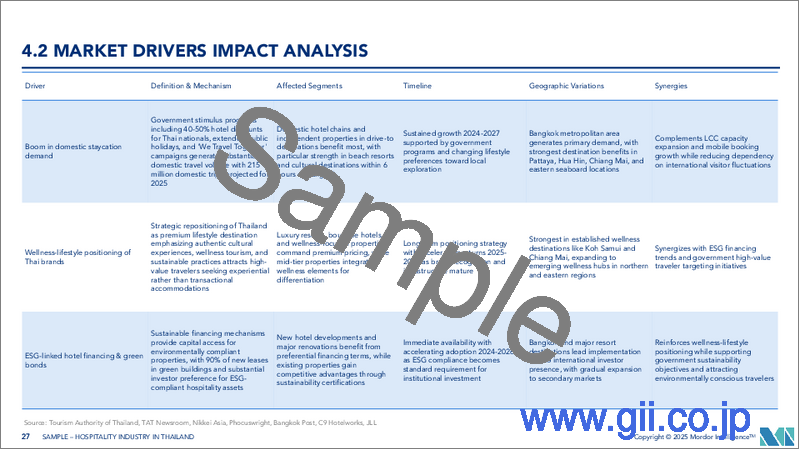|
|
市場調査レポート
商品コード
1689836
タイのホスピタリティ産業- 市場シェア分析、産業動向、成長予測(2025年~2030年)Hospitality Industry In Thailand - Market Share Analysis, Industry Trends & Statistics, Growth Forecasts (2025 - 2030) |
||||||
カスタマイズ可能
適宜更新あり
|
|||||||
| タイのホスピタリティ産業- 市場シェア分析、産業動向、成長予測(2025年~2030年) |
|
出版日: 2025年03月18日
発行: Mordor Intelligence
ページ情報: 英文 120 Pages
納期: 2~3営業日
|
全表示
- 概要
- 目次
タイのホスピタリティ産業市場規模は2025年に15億米ドルと推定され、予測期間(2025~2030年)のCAGRは5.67%で、2030年には19億8,000万米ドルに達すると予測されます。

活気ある観光産業に牽引され、タイのホスピタリティは経済において重要な位置を占めています。絵のように美しいビーチ、豊かな文化遺産、賑やかな都心など、タイは毎年何百万人もの観光客を魅了しています。格安のホステルやブティックホテルから豪奢なリゾートホテルまで、多様な宿泊施設がタイ市場の自慢です。宿泊施設だけでなく、食、エンターテインメント、ウェルネスアクティビティも充実しており、旅行者のパラダイスとしての魅力を高めています。しかし、他の観光中心経済と同様、タイのホスピタリティ・セクタも、世界経済の変動、自然災害、最近のCOVID-19パンデミックのような健康危機などの脆弱性に直面しています。しかし、こうした課題にもめげず、タイのホスピタリティ産業は持ちこたえ、その回復力と適応力を示し、地域のリーダーとして頭角を現しています。
タイのホテル産業は、進化する消費者の嗜好や世界の動向を敏感に察知しています。このセクタは現在、サステイナブル観光に軸足を置き、エコフレンドリー取り組みやウェルネスサービスを重視しています。例えば、プーケットにあるシックスセンシズ・ヤオノイは、エコフレンドリー施策や自然を重視することで、持続可能性を謳っています。さらに、タイのホテルは技術を取り入れ、非接触型チェックイン、モバイルルームキー、バーチャルコンシェルジュサービスなどのデジタルソリューションを展開しています。こうした技術主導の強化は、現代の旅行者の進化する期待に応えるものです。
タイのホスピタリティ産業は、国内外の若い旅行者の流入の増加に後押しされ、さらなる拡大が見込まれています。このセクタの成長を後押しする重要な要因は、タイ政府が観光事業の強化に向けた関心を高めていることです。特に、タイは世界で最も観光客の多い国の第9位にランクされています。ホテルにとって重要な業績評価指標は、観光客の収入と観光関連の収益に集中しています。ホテルプロジェクトの急増は、市場の勢いを後押しする顕著なきっかけとなっています。
タイのホスピタリティ市場動向
タイの観光セクタが急成長、景気回復を後押し
観光スポーツ省によると、タイは外国人観光客が急増し、昨年は2,700万人を超えました。前年はマレーシアがタイへの観光客の主要流入元で、中国、シンガポール、インドがこれに続きました。今年は3,600万人の外国人観光客を目標に、タイ政府は国の観光インフラを改善し、安全で魅力的な目的地として宣伝する努力を強めています。タイの観光セクタの復活はタイの経済にとって良い兆しであり、ホスピタリティやその他のセグメントの収入と成長を牽引する極めて重要な役割を強調しています。この成長軌道は今後も続くと予測されています。タイ政府は、医療、MICE(会議、インセンティブ、会議、展示会)、グリーンツーリズムの拠点として、積極的にプロモーションを行っています。
また、タイへの新しい航空路線の導入や便数の増加により、外国人の入国が増加しています。タイの活気ある観光・ホスピタリティ部門は、ますますタイ経済の要となっています。今年の外国人入国者数は予想を上回り、GDPの押し上げに直結しています。
ホテル建設プロジェクトのパイプラインはホスピタリティ産業の需要増に対応する見込み
タイのホテル建設パイプラインは、盛んな観光産業に後押しされた同国の急増する需要に見合うように設定されています。観光産業はタイ経済の重要な担い手として台頭しており、ホスピタリティ産業の成長を牽引し、他部門の低迷を補っています。基本的なアメニティから高級なオプションまで、ホスピタリティのサービスは常にその質の高さで称賛を集めています。さらに、先進国に比べて比較的手ごろな価格であるため、観光客はホスピタリティセグメントで高級な体験をすることができます。昨年、タイでは155のホテル建設プロジェクトが行われ、第4四半期には合計3万7,955室が建設されました。ホテル建設ではバンコクがトップで、プーケットが僅差で続いています。特筆すべきは、Radisson Hotel Groupが来年までにタイのポートフォリオを100のホテルとリゾートに拡大することを目指していることです。一方、Marriott International, Incは、年末までにタイ国内のホテル数を様々なカテゴリーで10軒増やす計画です。
タイのホスピタリティ産業概要
タイのホスピタリティ産業はセグメント化されており、国際的なブランドと国内ブランド、チェーンホテルが組み合わされています。ホテル/チェーンの大半は、独立系または国産ブランドのチェーンです。ブランドの普及率も伸びており、タイの国内外からの観光客が増加しています。Accor SA、InterContinental Hotels Group、Centara Hotels、Radisson Hotel Group、Hyatt、Marriott International, Incなどが産業の主要企業です。
その他の特典
- エクセル形式の市場予測(ME)シート
- 3ヶ月間のアナリストサポート
目次
第1章 イントロダクション
- 調査の前提条件と市場定義
- 調査範囲
第2章 調査手法
第3章 エグゼクティブサマリー
第4章 市場力学
- 市場の促進要因
- 観光誘致に向けた政府の取り組み
- 観光産業の成長が市場を牽引
- 市場抑制要因
- 持続可能性と競合が産業の成功を脅かす
- 熟練労働者の不足が市場課題
- 市場機会
- オンラインマーケティングの活用による顧客基盤の拡大
- 高級ホテルやブティックホテルの開発・設立の機会
- ポーターのファイブフォース分析
- 新規参入業者の脅威
- 買い手/消費者の交渉力
- 供給企業の交渉力
- 代替品の脅威
- 競争企業間の敵対関係の強さ
- COVID-19が市場に与える影響
- 宿泊施設と飲食品部門の収益フローに関する洞察
- 共同生活空間がホスピタリティ産業に与える影響に関する洞察
第5章 市場セグメンテーション
- タイプ別
- チェーンホテル
- 独立系ホテル
- セグメント別
- サービスアパートメント
- バジェット&エコノミーホテル
- 中上級ホテル
- 高級ホテル
第6章 競合情勢
- 市場集中度概要
- 企業プロファイル
- Accor SA
- MarrIoTt International
- InterContnental Hotel Group
- Centara Hotels
- Hyatt Hotels & Resorts
- Radisson Hotel Group
- Eastin Grand Hotel
- Cape & Kantary Hotels
- Compass Hospitality
- Dusit Hotels & Resorts
- Centre Point Hospitality
- Imperial Hotels & Resorts*
第7章 今後の市場動向
第8章 免責事項と出版社について
The Hospitality Industry In Thailand Market size is estimated at USD 1.50 billion in 2025, and is expected to reach USD 1.98 billion by 2030, at a CAGR of 5.67% during the forecast period (2025-2030).

Driven by its vibrant tourism industry, Thai hospitality is significant in its economy. Thailand's picturesque beaches, rich cultural heritage, and bustling urban centers entice millions of visitors annually. The market boasts diverse accommodations, from budget-friendly hostels and boutique hotels to opulent resorts. Alongside its lodging options, Thailand offers extensive culinary delights, entertainment avenues, and wellness activities, cementing its allure as a traveler's paradise. However, like other tourism-centric economies, Thailand's hospitality sector faces vulnerabilities, including global economic fluctuations, natural calamities, and health crises like the recent COVID-19 pandemic. Yet, undeterred by these challenges, Thailand's hospitality industry perseveres, showcasing its resilience and adaptability and emerging as a regional leader.
Thailand's hotel industry is keenly attuned to evolving consumer preferences and global trends. The sector now pivots toward sustainable tourism, emphasizing eco-friendly initiatives and wellness offerings. For instance, Six Senses Yao Noi in Phuket champions sustainability through eco-friendly measures and a strong emphasis on nature. Additionally, Thai hotels are embracing technology, rolling out digital solutions like contactless check-ins, mobile room keys, and virtual concierge services. These tech-driven enhancements cater to the evolving expectations of modern-day travelers.
The Thai hospitality industry is poised for further expansion, buoyed by a rising influx of domestic and international young travelers. A pivotal factor propelling this sector's growth is the heightened attention from the Thai government toward bolstering tourism. Notably, Thailand ranks ninth among the world's most visited countries. Key performance indicators for hotels revolve around visitor revenue and tourism-related earnings. The surge in hotel projects is a prominent catalyst propelling the market's momentum.
Thailand Hospitality Market Trends
Thailand's Tourism Sector Surges, Aiding Economic Recovery
According to the Ministry of Tourism and Sports, Thailand witnessed a surge in foreign tourist arrivals, crossing 27 million last year. In the previous year, Malaysia was the primary source market for tourists to Thailand, trailed by China, Singapore, and India. With a target of 36 million foreign visitors this year, the Thai government is increasing efforts to improve the nation's tourism infrastructure and promote it as a safe and attractive destination. The resurgence of Thailand's tourism sector bodes well for its economy and underscores its pivotal role in driving revenue and growth of hospitality and other domains. This growth trajectory is projected to persist in the coming years. The Thai government is proactively promoting the country as a hub for medical, MICE (meetings, incentives, conferences, and exhibitions), and green tourism.
Also, introducing new airline routes and increased flight frequencies to Thailand have bolstered foreign arrivals. Thailand's vibrant tourism and hospitality sector has increasingly become a linchpin of its economy. This year, international arrivals surpassed expectations, directly translating into a boost in the country's GDP.
Hotel Construction Project Pipeline is Anticipated to Meet the Increasing Demand in the Hospitality Industry
Thailand's hotel construction pipeline is set to match the surging demand in the country, bolstered by its thriving tourism industry. This sector has emerged as a key player in Thailand's economy, driving growth in hospitality and compensating for sluggishness in other sectors. The hospitality offerings, ranging from basic amenities to upscale options, consistently garner praise for their service quality. Moreover, compared to developed nations, Thailand's relatively affordable prices grant tourists wider access to high-end experiences in the hospitality sector. Last year, Thailand saw 155 hotel construction projects, totaling 37,955 rooms in the fourth quarter. Bangkok leads the pack in hotel construction, closely trailed by Phuket. Notably, Radisson Hotel Group aims to expand its Thai portfolio to 100 hotels and resorts by next year. Marriott International, on the other hand, plans to augment its hotel count in Thailand by 10, spanning various categories, by year-end.
Thailand Hospitality Industry Overview
The Thai hospitality industry is fragmented and combines international and domestic brands and chain hotels. The industry's majority of the hotels/chains are independent or homegrown brand chains. The brand penetration rate is also growing, increasing Thailand's domestic and international tourist activities. Accor SA, InterContinental Hotels Group, Centara Hotels, Radisson Hotel Group, Hyatt, and Marriott International, Inc. are a few of the leading companies in the industry.
Additional Benefits:
- The market estimate (ME) sheet in Excel format
- 3 months of analyst support
TABLE OF CONTENTS
1 INTRODUCTION
- 1.1 Study Assumptions & Market Definition
- 1.2 Scope of the Study
2 RESEARCH METHODOLOGY
3 EXECUTIVE SUMMARY
4 MARKET DYNAMICS
- 4.1 Market Drivers
- 4.1.1 Government Initiatives to Attract Tourism
- 4.1.2 Growth in Tourism is Driving the Market
- 4.2 Market Restraints
- 4.2.1 Sustainability and Competition Threaten Industry Success
- 4.2.2 Lack Of Skilled Labour Is A Challenge For The Market
- 4.3 Market Opportunities
- 4.3.1 Online Marketing can be Leveraged to Expand the Customer Base
- 4.3.2 Opportunity To Develop And Establish Luxury Hotels And Boutique Properties
- 4.4 Porter's Five Forces Analysis
- 4.4.1 Threat of New Entrants
- 4.4.2 Bargaining Power of Buyers/Consumers
- 4.4.3 Bargaining Power of Suppliers
- 4.4.4 Threat of Substitute Products
- 4.4.5 Intensity of Competitive Rivalry
- 4.5 Impact of COVID-19 on the market
- 4.6 Insights on Revenue Flows from Accommodation and Food and Beverage Sectors
- 4.7 Insights on Shared Living Spaces Impact on the Hospitality Industry
5 MARKET SEGMENTATION
- 5.1 By Type
- 5.1.1 Chain Hotels
- 5.1.2 Independent Hotels
- 5.2 By Segment
- 5.2.1 Service Apartments
- 5.2.2 Budget and Economy Hotels
- 5.2.3 Mid and Upper-Mid Scale Hotels
- 5.2.4 Luxury Hotels
6 COMPETITIVE LANDSCAPE
- 6.1 Market Concentration Overview
- 6.2 Company Profiles
- 6.2.1 Accor SA
- 6.2.2 Marriott International
- 6.2.3 InterContnental Hotel Group
- 6.2.4 Centara Hotels
- 6.2.5 Hyatt Hotels & Resorts
- 6.2.6 Radisson Hotel Group
- 6.2.7 Eastin Grand Hotel
- 6.2.8 Cape & Kantary Hotels
- 6.2.9 Compass Hospitality
- 6.2.10 Dusit Hotels & Resorts
- 6.2.11 Centre Point Hospitality
- 6.2.12 Imperial Hotels & Resorts*






